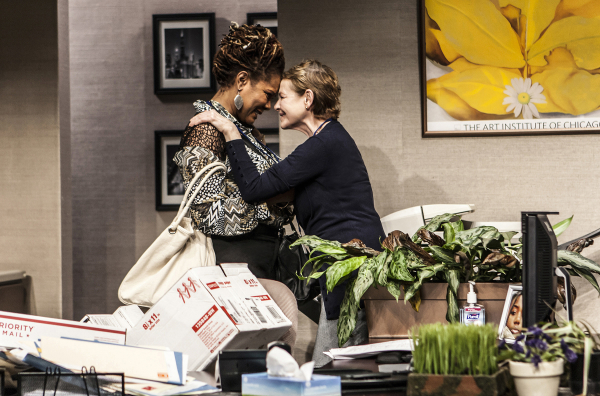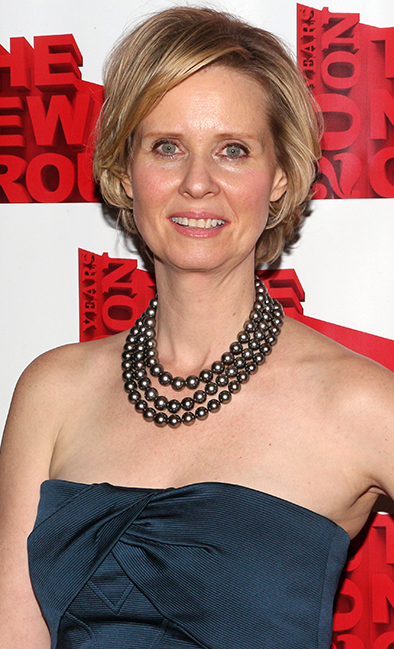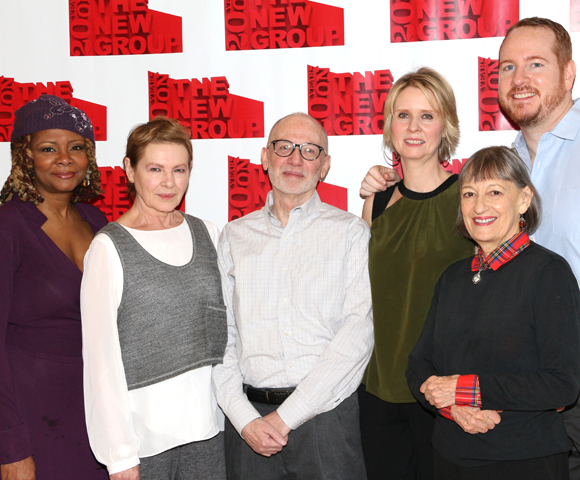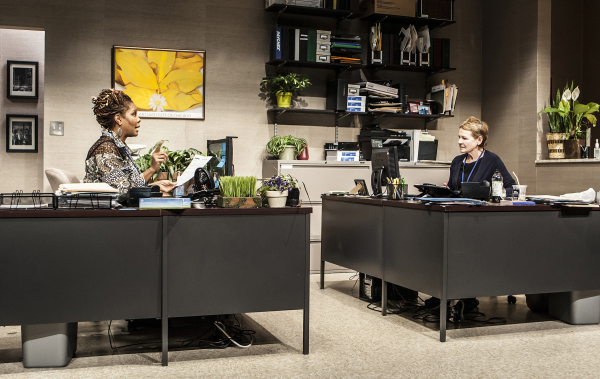Rasheeda Speaking's Tonya Pinkins and Cynthia Nixon Discuss Racial Conflict Onstage and Off

(© Monique Carboni)
A war of "microaggressions" plays out in Joel Drake Johnson's new racially charged play Rasheeda Speaking, now running off-Broadway in a production of the New Group at the Pershing Square Signature Center. Coined in 1970 — just past the peak of the Civil Rights Movement — the word gives concrete terminology to the insidious ways in which minority groups are still marginalized in society.
"It's a phrase that I didn't know until a few weeks ago," said Cynthia Nixon, a Tony-, Emmy-, and Grammy-winning actress who makes her directorial debut with the four-person drama.
"The person doing them is not even aware," Nixon explained. "They're so small, but it's like water torture. It's the buildup of them hour after hour, day after day, year after year, that really takes their toll."
In Rasheeda Speaking, this gradual buildup is condensed to four workdays at a Chicago surgeon's office. Caucasian and African-American receptionists Ileen and Jaclyn (played by acclaimed actresses Dianne Wiest and Tonya Pinkins, respectively) begin the play as friends. However, their boss soon recruits Ileen to document all of Jaclyn's missteps — a task that picks up speed after Ileen witnesses Jaclyn's brusque demeanor toward an elderly white patient. Once Jaclyn finds her job on the chopping block, she turns the tables on her colleagues, giving them a taste of their own medicine with a powerful — and calculated — "microaggressive" war of her own.
"The things that they do to each other are really small in the scheme of things," noted Pinkins, "but you can see how over just four days these little bitty things become catastrophic."
Names like Eric Garner, Michael Brown, and Trayvon Martin have come to define these catastrophes as the 24-hour news cycle constantly confronts us with the devastating consequences of this silent snowball effect. Nothing quite so explosive goes down in the corporate environment of Johnson's play. It does, however, try to pinpoint the epicenter of the subtle tectonic movement that over time, builds to the earth-shaking proportions we see in our daily headlines. Ironically — or perhaps tellingly — this hot spot of microscopic assaults nestled itself in the company's very own rehearsal room, as Pinkins, just like her character, assumed the familiar role as the play's only African-American voice.

(© David Gordon)
"I think it was hard on Tonya being the only native-born African-American in the room," said Nixon. "I also think in some torturous way it mirrored what was happening in the play. Constantly being the only African-American and constantly having to navigate and explain yourself and trying to correct people's misguided perceptions of you, even though they might not come from a malicious place."
Johnson, a white playwright, originally approached Rasheeda Speaking from the perspective of the roughly handled patient — a real-life experience he decided to dramatize after hearing the discomforting news that the complaint he lodged against the African-American receptionist led to her termination. Only later did he decide that the more productive exercise would be to step inside the receptionist's shoes and try to write the world from her point of view. But, as might be expected, there were times that Johnson's imagined rendering of Jaclyn would butt up against Pinkins' own firsthand experiences.
"I'm from Chicago, my family's all there, they worked at the hospitals — I could think about anybody in my family and know who this woman is," said Pinkins. "That's always a challenge when you're the only black person in the room and you're trying to speak to your own experience… I had to pick my battles."
One battle that Pinkins felt particularly passionate about during rehearsals concerned a scene in which her character, in an act of manipulation, chooses to swear a bald-face lie on a Bible. "I just felt, in a deal-breaker way, that a black woman is not swearing on a Bible for pretend," she said. "So what we worked out together was that [Jaclyn] would wrap something else in a cloth [to swear] on."
"I have no idea what it's like to be a black woman," Nixon freely acknowledged. "Nor will I ever know. So that did place a real burden on Tonya to be like, No, I would never — I could never do that. And let me explain why."

(© David Gordon)
Still, for every battle won, there was a concession, or several, that had to be made to the playwright and the story he originally set out to tell.
"I think anyone can write anything," Pinkins adamantly agreed. "But there are things about black women that just aren't there because Joel can't know them. But it's still a wonderful play, so I feel an obligation to, as best I can, make this human being as three-dimensional as possible."
Yet, just like the minuscule jabs that eventually come to a head in Johnson's play, each concession Pinkins was forced to make left its own microscopic dent. "You might not think of it as 'racism,'" Pinkins explained, "but if I tell you that this is not an accurate portrayal of me and you tell me I'm wrong, that's a denial of my reality, my culture, my experience."
Despite its weighty implications, the comment held nothing accusatory — simply a bare statement about the subtle miscommunications, which, as we see in the rapidly disintegrating relationship between Jaclyn and Ileen, can become a lethal poison.
"I think the play shows even within an interracial friendship — a real friendship — how much we don't get each other and how painful that is," said Nixon. "A million plays or movies or books about black people and white people coming together across the racial divide and loving each other despite all the obstacles — that's not helpful for us. That's not what we need to hear. We need to hear there's a problem, and it's thorny and deep and painful and awkward. If we hide them beneath political correctness or a desire not to antagonize, it's hard to get anywhere."
"That to me is the most exciting thing about it," Pinkins added, reflecting on all of the battles (both won and lost) that she took on from behind Jaclyn's cluttered desk. "It is uncomfortable for the audience and it makes them have to reflect on themselves. So many people right now, all over the country, want to have the conversation and don't know where to start, so [it's] been this great opportunity for people to have the conversation they really want to have. That's the best thing that theater can ever do."











